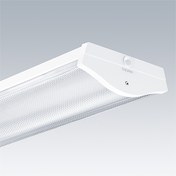College / COLLEGE LED3700-840 L1200 EIL2 PC CL
96541889
▼ Data Sheet
A high performance, Surface mounted, LED luminaire. Electronic, fixed output control gear with 2 hour, manual test, emergency lighting circuit. Class I electrical, IP44. Body: white painted steel. End caps: white polycarbonate with a curved, precision extruded clear prismatic polycarbonate diffuser. Ø21.5mm cable entry hole in the centre of the back spine with optional cable entry through each end cap. Fitting supplied with sealing grommets and innovative "quick fix" horseshoe and sliding washers for direct screw fixing to surface, fixing centres 1150mm. Standard BESA fixings. Can be suspended using wire suspension accessory kit (to be ordered separately). 4 x 2 x 2.5mm² piano key terminal block. Complete with 4000K LED
Emergency Classificationin accordance with AS2293 appendix C:
C0 = D63, C90 = D25
Dimensions: 1220 x 217 x 90 mm
Luminaire input power: 31.7 W
Weight: 4.5 kg
- LED
- GLedReP
- 850°
- HACCP
- IK05
- IP44
- LLedNr
- RCM
- SC1 - Protection Class 1
- Ta= -10 to +25

